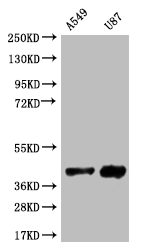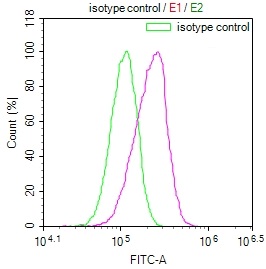The SRR monoclonal antibody was generated using the synthesized peptide derived from human SRR protein as the immunogen. The gene sequence of the SRR monoclonal antibody was obtained by sequencing the cDNA and cloning it into a plasmid vector, which was then transfected into a suitable host cell. Following that, the resulting SRR recombinant monoclonal antibody was purified using affinity chromatography and its specificity was tested in ELISA, WB, and FC. It can specifically recognize human SRR protein.
Serine racemase (SRR) is an enzyme that catalyzes the conversion of L-serine to D-serine, an important co-agonist of the N-methyl-D-aspartate (NMDA) receptor, which plays a critical role in the regulation of synaptic plasticity, learning, and memory. D-serine acts by binding to the glycine site of the NMDA receptor and enhancing its activity. Serine racemase mainly regulates the levels of D-serine in the brain and modulate the activity of the NMDA receptor.







